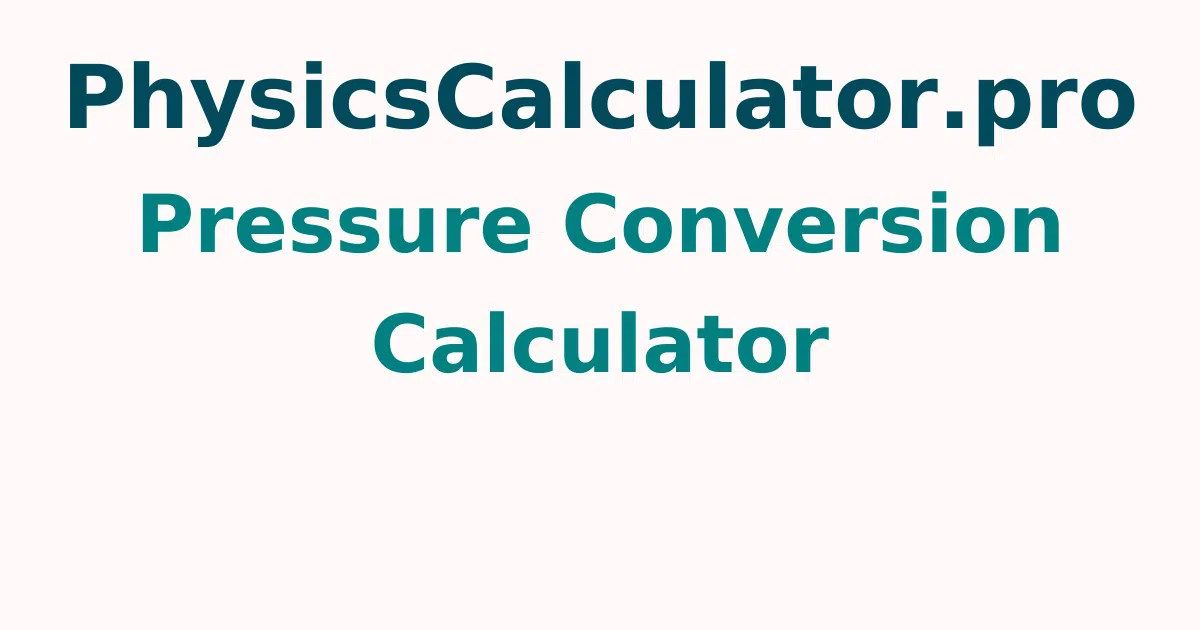Pressure Conversion Calculator
Pressure is the force that is applied perpendicular to the surface of a given object per unit area over which that force is distributed uniformly in that object. One type of pressure is the Gauge pressure which is the pressure relative to the ambient pressure acting on the object. There are various units that are used to express pressure, the standard one is Pascal.
Pressure - Definition
Pressure is a physical quantity that is the amount of force applied to a certain object or area in the direction of the applied force. The formula to calculate the pressure is P = F/A, which means the force per area perpendicular to the surface. The SI unit of pressure is Pascal (Pa).
Types of Pressure
- Aerostatic pressure - also called the pressure in gases, this is the pressure inside the gas arising from its own weight.
- Hydrostatic pressure - similar to aerostatic pressure this pressure is in liquids and is arisen from the weight of the liquid.
- Acoustic pressure - a small deviation from the average value of atmospheric pressure, occurring during the propagation of an acoustic wave in it is called Acoustic pressure, it is similar to the pressure produced in the waves of the musical instruments as well.
What is Standard Pressure?
The recently used values of standard pressure depend on the committees and are usually 100 kPa or 101.325 kPa, which is approximately 14.5 or 14.7 psi. Standard pressure is the value of pressure defined by scientific and metrological organizations to allow comparisons between different experimental results in the same conditions.
How to Convert Units of Pressure?
A Conversion is performed by using a conversion factor or mathematical calculations which derive this factor. By knowing the conversion factor, converting between units can become a simple mathematical question, the same goes for pressure conversion too, here is how:
A * C = E
Where A is the initial value, C is our conversion factor, and B is defined as the end converted result of the calculation.
For a simple conversion from any unit into pascals, let's take an instance, from 1 bar, the user just multiply by the conversion value, this is depicted as follows:
1 bar * 100000 [ (Pa) / (bar) ] = 100000 Pa
To convert from Pa into units we need to divide it by the value in the or, multiply by the reciprocal by, 1/x.
100000 Pa / 100000 [ (Pa) / (bar) ] = 1 bar
The conversion among any units in from A to B, the user can multiply by the factor for A to convert A into Pascals then divide by the factor for B to convert out of Pascals. Or, as another method, the user can find the single factor that he needs by dividing the A factor by the B factor.
How to Use the Pressure Conversion Calculator?
The calculator developed by us is used to convert pressure in its different steps, here is how:
- Step 1: Select and enter the units and the value to convert in the input field of the calculator.
- Step 2: Now click the button “proceed” to get the desired result.
- Step 3: Finally, as the last step the calculator will display the conversion of pressure value from one unit to the other.
Examples of Pressure Conversion
Example 1.
Gas is at a pressure of 760mm Hg. What is its pressure in psi?
Solution:
The atmospheric pressure at sea level is 14.7 psi.
Example 2.
Gas is at a pressure of 100kPa. What is its pressure in atmospheres?
Solution:
The air pressure is about 80% of standard atmospheric pressure at sea level, so this gas is at 80kPa originally. For other significant figure purposes, the standard pressure of 760 mmHg has three significant figures.
FAQs on Pressure Conversion
1. Which Formulae are generally used in conversion for pressure?
Pressure is a physical quantity that is defined as the amount of force applied to a certain object or area. The formula to calculate the pressure is P = F/A
2. What is the meaning of Torr?
A unit of pressure equal to ¹/₇₆₀ of an atmosphere (about 133.3 pascals)
3. What are kPa units?
kilopascal (kPa), one thousand times the unit of pressure and stress in the meter-kilogram-second system (the International System of Units [SI]).
4. What is the unit of pressure?
Pascal is the unit of pressure.
5. How do you find the total pressure of a mixture?
For a mixture of ideal gases, the total pressure exerted by the mixture equals the sum of the pressures that each gas would exert on its own.
